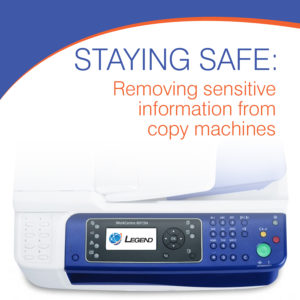 A lot of folks tend to overlook the fact that copy machines, not unlike many of the desktop applications we use, retain a saved copy of the documents we copy on the machine. In fact, more and more copiers today come with their own hard drives and as such, store images of every document they ever scan.
A lot of folks tend to overlook the fact that copy machines, not unlike many of the desktop applications we use, retain a saved copy of the documents we copy on the machine. In fact, more and more copiers today come with their own hard drives and as such, store images of every document they ever scan.
For businesses that handle more sensitive information, these images can present a challenge. Things like social security numbers, credit card accounts and medical records can be stored in the copy machine and as a result – become prime targets for identity thieves.
Today, we’ll share with you some steps you can take to delete that information from your copier before it becomes compromised.
FIRST STEP
It’s always a good idea to make sure you have some sort of encryption or disk overwrite software on your copier. In some cases, your copier may come with that software preinstalled on the machine, but in many cases, you’ll have to purchase it separately. What the encryption software does is that it makes sure that every copied image file is encoded while simultaneously overwriting the file on the disk to show random characters on the existing data – making it next to impossible to reconstruct the original file.
SECOND STEP
Use your security software to conduct regular disk overwrites to make sure that sensitive data on your hard drive is deleted. On some copiers, this can be complex, on others, not as much. Be sure to talk to your office supply provider for information on how to do this. If you don’t have those capabilities, see what you can do to make sure that you do.
THIRD STEP
Perform a second disk overwrite before you send the hard drive for service or handing it over to your vendor for disposal. Doing so just makes sure you have your back covered should someone attempt something in the go-between.
FOURTH STEP
Anytime you destroy anything pertaining to sensitive information, always be sure to acquire what they call a ‘certificate of destruction.’ Those certificates serve as a legal guarantee from your vendor that the information was, in fact – destroyed.
SOME OTHER TIPS
It’s always a good idea to schedule routine disk overwrites to provide a safety net in case you forget to do it. Also putting up a sign above your machine can serve as a friendly reminder to staff that the machine contains a hard drive that must be cleared in so that sensitive information that shouldn’t stored doesn’t – in fact- get stored.
A WORD TO THE WISE
Always make sure you consult with your technician before you go anywhere near your own hard drive. In some cases, opening up your copier can void your warranty and in extreme situations, can make the system inoperable. Be patient and get the right advice from the professionals to avoid messing anything up.

